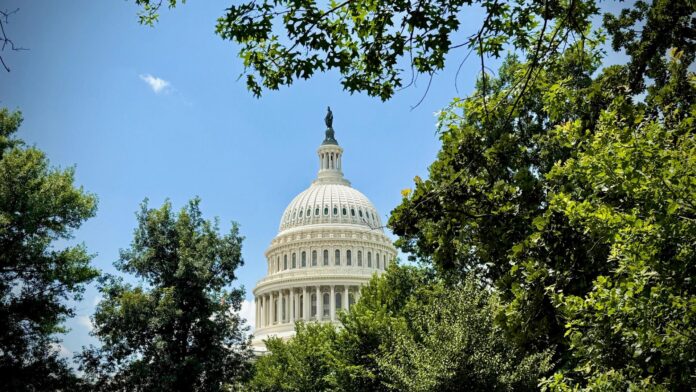U.S. bankers are pushing hard for revisions of the new stablecoin law even before regulators have begun the first steps of writing the rules.
Updated Aug 15, 2025, 1:59 p.m. Published Aug 14, 2025, 8:34 p.m.
Wall Street bankers are hammering away at some provisions of the new U.S. stablecoin law that was hailed by President Donald Trump and the crypto sector as a huge first step toward establishing a fully regulated U.S. industry, and the banks are joined by unusual bedfellows from the consumer-advocate world in sounding alarms.
Hoping to revise and cut provisions that might threaten aspects of the current financial system, the American Bankers Association and other bank lobbying groups aligned in a letter this week with Americans for Financial Reform — usually a staunch opponent of Wall Street’s policy aims — and the National Consumer Law Center. One provision of the stablecoin law known as the Guiding and Establishing National Innovation for U.S. Stablecoins (GENIUS) Act lets a stablecoin-issuing subsidiary of a state-chartered uninsured depository institution run money-transmission and custody services nationwide, which the bankers argue bypasses existing state licensing and oversight.
Their letter asked several key U.S. senators to insist that whole section be erased entirely.
“Ignoring state law in this regard invites regulatory arbitrage, allowing certain uninsured depository institutions special privileges to operate across state lines as federally insured banks currently do, but without the panoply of regulatory and supervisory requirements, or limitations on preemption applicable to those institutions,” the August 13 letter argued.
The bank lobbyists, also cooperated in a separate effort to protect deposits and other core aspects of their businesses from the GENIUS Act, arguing in another letter to lawmakers this week that the law leaves an opening for crypto firms to offer returns on stablecoins. While the law bans stablecoin issuers themselves from offering interest or yield, it doesn’t stop the issuers’ affiliates or exchanges from doing so indirectly. The bankers fear a massive loss of deposits and money-market fund activity from the resulting rivalry stablecoins might offer.
“Congress must protect the flow of credit to American businesses and families and the stability of the most important financial market by closing the stablecoin payment of interest loophole,” according to the groups, including the ABA, Bank Policy Institute, Financial Services Forum and others. Banks turn deposits into loans, so the lack of deposits threatens necessary U.S. lending.
Faryar Shirzad, the chief policy officer at U.S. crypto exchange Coinbase, criticized the banks’ position in postings on social media site X.
“Congress shouldn’t be in the business of passing legislation that takes away consumer choice and the opportunity for the average person to earn returns on their hard-earned dollars,” he wrote, additionally arguing that the $6 trillion figure on what desposits may be at stake is overblown.
“Let’s play along for a second,” Shirzad added. “If customers really would move $6T away from banks into stablecoins, what does that say about what value consumers feel like they’re getting from their banks?”
The GENIUS Act was signed into law by President Trump, but the bigger and more complex legislation to regulate U.S. crypto markets is still pending. That future bill, which already passed the House of Representatives as the Digital Asset Market Clarity Act, could still overhaul provisions of the stablecoin law, even before that new law is converted into rules by the U.S. financial regulators. That’s what the bankers are advocating, alongside their temporary customer-advocate allies.
Read More: Banks Must Adopt Crypto or ‘Be Extinct in 10 Years,’ Eric Trump Says
UPDATE (August 14, 2025, 21:51 UTC): Adds comment from Coinbase’s Faryar Shirzad.
Jesse Hamilton
Jesse Hamilton is CoinDesk’s deputy managing editor on the Global Policy and Regulation team, based in Washington, D.C. Before joining CoinDesk in 2022, he worked for more than a decade covering Wall Street regulation at Bloomberg News and Businessweek, writing about the early whisperings among federal agencies trying to decide what to do about crypto. He’s won several national honors in his reporting career, including from his time as a war correspondent in Iraq and as a police reporter for newspapers. Jesse is a graduate of Western Washington University, where he studied journalism and history. He has no crypto holdings.
More For You
Czech Police Arrest Donor in Billion-Dollar Bitcoin Scandal: Report
Authorities detain convicted trafficker Tomáš Jiřikovský in probe over bitcoin gifted to Ministry of Justice, with the case expanding to money laundering and drug charges.
What to know:
- Police detained Jiřikovský and secured evidence linked to a controversial bitcoin donation.
- The investigation is now focused on money laundering and drug trafficking.
- The Czch government survived a no-confidence vote in June over the $45 million donation.





